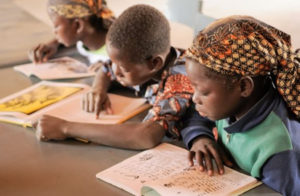Ghana government launches Early Childhood Education Policy
 Government has launched the Early Childhood Education Policy with a call on stakeholders to support its implementation to achieve the desired outcomes for nation building.
Government has launched the Early Childhood Education Policy with a call on stakeholders to support its implementation to achieve the desired outcomes for nation building.
The Policy aimed at using a holistic approach to developing the social, emotional, physical, spiritual, language and cognitive skills learning of the child.
The Policy comprised six action areas: Effective planning and management, Curriculum development and implementation, Pre-service and in-service teacher training, Families and community engagement, Child-friendly safe environment and monitoring, and Regulation and quality assurance.
Reverend John Ntim Fordjour, the Deputy Minister of Education-designate, said government had rolled out interventions to ensure effective implementation of the Policy including teacher exposure to early childhood education and development specialisation, and incentivising teachers to read Early Childhood Education at the Masters level.
The other measures to be implemented are: the Award system for parents for attendant of pupils, Recognition of parents and communities in Kindergarten (KG) education, Recognition of pupils on monthly or weekly basis to promote the smart kids concept, and identification of KG model schools for Centre of Excellence.
He said the country’s two-year education policy for KG was part of its commitment to free and compulsory basic education.
Rev. Fordjour said government recognised the benefits of early childhood education, hence the investments made in it for the past two decades towards achieving the Sustainable Development Goal (SDG 4.2).
The Goal sought to ensure that by 2030 all girls and boys have access to quality early childhood development to be ready for primary education.
He said government believed that development and sustainability rested on the strong foundation and quality of early childhood education delivery made available to most vulnerable and disadvantaged children.
Evidence showed that the consequences of ECE did not end upon transition to primary school but last for a lifetime.
The Deputy Minister-Designate said government would facilitate an enabling environment for an integrated approach to strengthening collaboration with all relevant stakeholders and build a strong foundation for all KG children to prepare them for primary education and beyond.
Hajia Samira Bawumia, the wife of the Vice President, commended stakeholders in the formulation of the Policy, saying it would promote inclusive education and awareness and enhance their wellbeing.
She said the basis for human development were attributed to early childhood education and that the policy would bring hope, achieve success for quality education, and bridge the inequality gap in the educational system.
“We need to work together to address the needs of young children for a holistic and comprehensive national development because we have a duty to commit ourselves to the growth of our children’s education,” she said.
Madam Anne-Clare Dufay, the UNICEF Country Representative, commended government for the leadership in formulating the policy to respond to the needs of young children in education.
“Ghana is the leader in pre-primary education in Sub-Sahara Africa. We need to invest in early childhood education because this is where the brain of the child develops to give him or her the best start of life”, she said.
Madam Dufay said UNICEF had provided government with the technical and financial support to improve early childhood education, including the development of KG learning tools.
Later, Rev Fordjour inaugurated the Early Childhood Education Committee and charged the members to implement the Policy effectively.
Source: GNA
